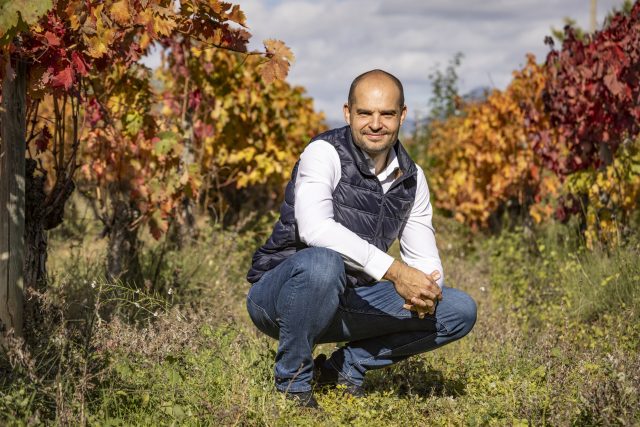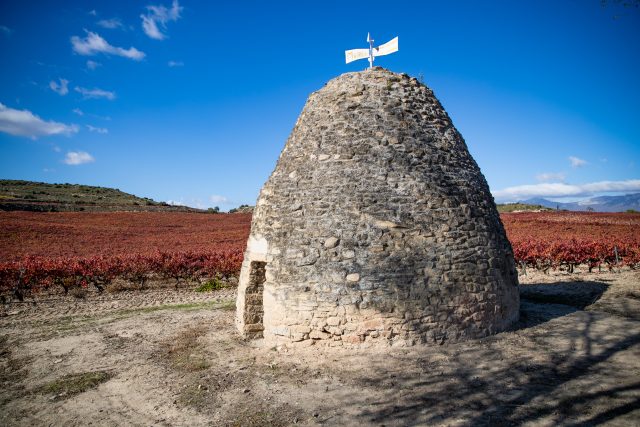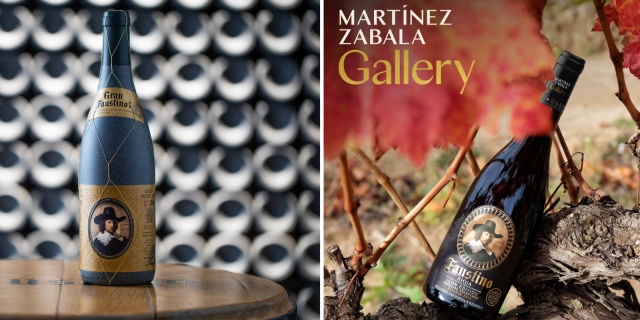This website uses cookies so that we can provide you with the best user experience possible. Cookie information is stored in your browser and performs functions such as recognising you when you return to our website and helping our team to understand which sections of the website you find most interesting and useful.
‘Long-term perspective’ key to Faustino’s success, says winemaker
Bodegas Faustino’s winemaker explains how a “responsibility to watch projects in the long-term perspective” guides the winery to its future.

“I believe that when people seek wine from a specific region, they are searching for a distinct taste,” says Juan José Díez, winemaker at Bodegas Faustino. “The essence of Rioja is rooted on the soil of our vineyards and in barrel ageing and the blending of local grape varieties, primarily Tempranillo. Therefore, I see it as my duty at Bodegas Faustino to preserve this style and traditions, highlighting our roots.”
Certainly, Bodegas Faustino (part of the Familia Martínez Zabala group) is happy to be associated with those traditions. From the Rembrandt portrait that adorns its labels to its market-leading position as a producer of Rioja Gran Reserva, the Rioja producer is proud to celebrate the region’s heritage.
For Díez, Rioja is unique among the world’s fine red wine producing regions. Bordeaux, for instance, has lower average temperatures and less Atlantic influence than Rioja, while California does not share Rioja’s focus on indigenous grape varieties. With a unique heritage to protect, Díez uses traditions to safeguard it.
Led by the land
Fortunately, Bodegas Faustino has an enviable selection of vineyards with which to make a range of wines because as the winemaker says, “land is everything”. It owns 650 hectares, which Díez describes as “an impressive puzzle of vineyards spread across in three zones of Rioja Alavesa and Rioja Oriental”. The wide selection enables Díez and his team to craft wines consistently, even in years with more challenging weather conditions.
Moreover, the patchwork of vineyards enables Díez to craft distinctive cuvées. Two of its finest examples are the traditional Gran Faustino I wine and the more modern Faustino Icon, both of which are part of the Martínez Zabala Gallery collection of fine wines. This range represents an exclusive selection of unique and singular wines that comes from the best vineyards.
“In search of the perfect vineyard for Gran Faustino, a wine planned for extremely long ageing, our aim was to discover emblematic plots that could best represent the Rioja Alavesa region,” explains Díez. “Consequently, we opted for plots situated in close proximity to the winery in Oyón, planted with Tempranillo, Graciano and Mazuelo. They boast a southern exposure, facilitating ideal ripening conditions.”
“Conversely, for Faustino Icon, we envisioned a completely distinct concept, using Tempranillo and Graciano and prioritising fruit-forward Rioja expressions. We selected a small plot in the Malpica area with higher temperatures, featuring bush vines of Tempranillo which enable us to achieve highly concentrated fruit flavours and a more modern style.”

In both wines, Rioja’s traditional ageing regimens are key to the end result. “In the work on the ageing process it is very important to have the ‘sixth sense’ of tasting,” says Díez. The choices of barrel, toast and racking are made by Rioja winemakers based on decades of experience, an almost intuitive process.
A modern approach to an established region
Tradition is not his only tool, however. Innovation is a driving force for Bodegas Faustino, especially when faced with the challenges of climate change and evolving consumer tastes.
Recent projects at the winery have used the latest technology to protect the environment and produce award-winning wines that are better adapted to sustainable production. For instance, it has isolated over 160 strains of native yeasts, analysing them for their organoleptic and performance qualities and their influence on natural vineyard protection. The results should provide Bodegas Faustino with a library of yeasts from which to choose, allowing the team to craft unique wines and ones better suited to sustainable production.
The research team has likewise been busy assessing the potential of grape varieties in an age of climate change. Bodegas Faustino has planted a single vineyard in a hotter zone with ten varieties of its better vines, comparing their performance directly with the same varieties in other zones. By analysing the flavours, alcohol levels and acidity, the winery is selecting varieties and clones that will cope best as Rioja becomes hotter.
In a warming climate, such projects help guard against the threats of heat stress and overripe grapes. However, the changing climate is also opening doors for the longstanding producers.
“At this juncture,” says Díez, “we bear a resemblance to the Champagne region, where historically, there has been a similar philosophy of working with different zones and vineyards to preserve the quality and taste of each vintage.”
Although the two regions produce markedly different styles, Díez believes more reliable recent vintages have allowed both to change their practices and increase the quantity of single vineyard wines. “Over the past 20 to 30 years, there have been changes; for instance, vineyards that previously didn’t ripen consistently every year over the last two decades are now ripening almost annually. This opens the door to single-vineyard wines.”
It is a complex picture: a world where ancient varieties are subject to cutting edge research and where traditional cellars have their temperature controlled from a mobile phone. Yet in its diverse portfolio, Bodegas Faustino is demonstrating that tradition can sit alongside innovation in the region.
For Díez, at least, the two concepts are not far apart. “I think that traditional Rioja in terms of sustainability and balanced viticulture, is all about responsibility to watch projects from a long-term perspective,” he explains. Whether a traditional winemaking practice or the latest experimental technology, his guiding principles are the same: “consistency, patience, working while listening to the vineyard, feeling the wines and treating them with passion.”


